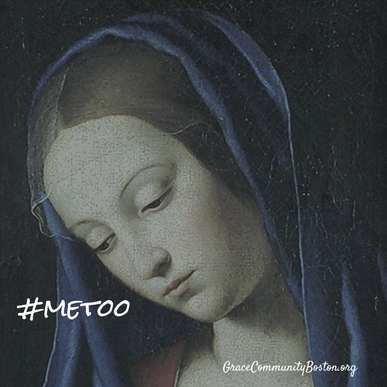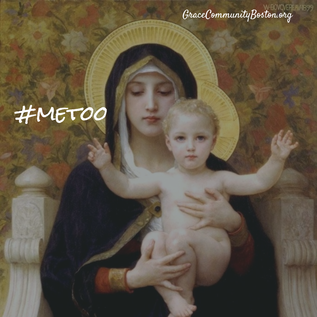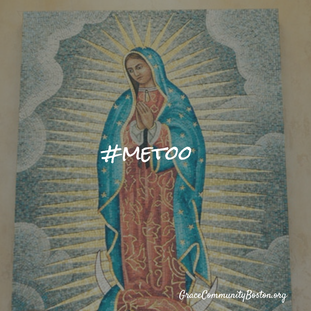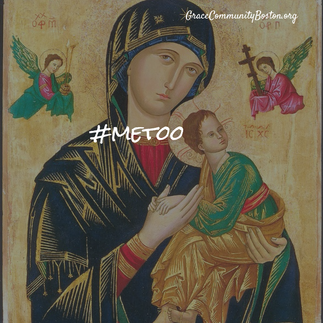 I never believed Mary was a virgin. Even before I knew what “virgin” meant, I intuited there was something wrong about the word. My questions regarding Mary’s mysterious virginity were often met with whispers or “we’ll tell you when you’re older.” Later when I knew what the word virgin meant, I rejected that title for Mary even more vehemently. Mothers were a part of my daily life; in my limited experience as a child, mothers were holy regardless of their sexual status. From my own mother to my best friend's mother to the mother of the children I babysat: I knew a mother’s care was unrelated to her sexual proclivity. I suspected Mary loved her child wrapped in swaddling clothes the way all mothers I knew loved their children--deeply and devotedly. I also suspected, and later knew for a fact, that every mother did what the farm animals I saw growing up did. My mother had sex. My best friend’s mother had sex. The woman I babysat for had sex. Mary had to have had sex too. How else would she have become a mother? With no knowledge of IVF and little awareness of adoption, in my young mind, sex was a prerequisite to motherhood. Furthermore, sex did not make motherhood “yucky.” Instead, Hollywood made sex yucky. Therefore, I concluded with certainty: Mary was no virgin. So why on God’s green earth did the gospel proclaim that Mary was a virgin? Why did the early writers of scripture think it was necessary for Mary to be a virgin? Why couldn't we believe that, like the many women before who had become pregnant, she also became pregnant via sperm and egg, the natural sequence of procreation?  I believe Mary’s pregnancy was undesired, not only by her, but by her community. Undesired (different from unwanted) pregnancies are a common occurrence. Most women unexpectedly find themselves pregnant at some point in their life. Depending on their circumstances these pregnancies range from a welcome surprise, to an inconvenience, to a deeply terrifying predicament. The factors surrounding each pregnancy are different, but for those women who find themselves terrified, it almost always has something to do with power. In Mary’s time if an unmarried woman was found to be with child there was one course of action: stoning. And there was nowhere to flee, because anywhere she fled, the rules would be the same. Women were the property of their fathers and then their husbands. Mary was without power. So why would Mary risk having sex? I think that Mary was raped, like so many women before and after her. As a powerless woman, she had no control over her circumstances, no protection from her attacker, no recourse to the law. Instead she was a young girl, betrothed to a man, who found herself confronting a death sentence. Historically we know that Mary lived in an occupied country. Ancient Palestine was under Roman rule. And if we can draw any inference from other occupied countries, violence was everywhere. Palestine was kept under Roman rule through the terrifying violence of its military. The likelihood that Mary was raped by a Roman soldier is high.  My theory of Mary’s undesired pregnancy is this: like many other powerless women in Ancient Palestine, Mary was raped by a Roman soldier. She just happened to be one of the unlucky ones who became pregnant and could not blame her pregnancy on her betrothed. Thankfully for Mary, Joseph was a magnanimous and compassionate man. He protected Mary, accepted her as his wife, and spared her execution. He broke the rules in order to be kind, as would his son three decades later. *** So what does this mean about the Christmas story? Does it make Jesus no longer God’s Son? Does it make the whole story a filthy tale of sexual power? Why would I want to ruin the lovely story of the manger? I don’t. In fact, I am seeking to create a story more powerful and more consistent with the Gospel. Mary’s story has taken on an entirely new meaning since I have come to believe that she, like many women, was a rape victim.  Mary's #metoo story speaks of a God who can transform violence into something whole. It is a story about the God who turns the crucifixion into the empty tomb. By nature, this same God would transform a violent rape into a magnificent child, with 10 fingers and 10 toes, wrapped in swaddling clothes and lying in a manger. And God did transform the unwanted sexual violence of an abusive occupier into a beloved child. And this child would grow to be a man who preached a redeemed social order-- a social order in which the first would be last, in which the occupier would be powerless. *** Is this really why the gospel writers chose to call Mary a virgin? Maybe. I can’t be certain, but it seems a perfect way for a male culture to hide the truth. For too long we have been hiding the insidious truth that many men use forced sex to dominate women. We have kept this secret of violence-sex-power for so long we can’t admit that maybe Mary was a victim too. So we’ve embraced her virginity and become complicit. Virginity was more believable than speaking the truth about sexual violence and harassment. But those days are done. The tide of #metoo cannot be held back any longer. And if you think there has been a tidal wave of #metoo confessions, just wait. There's a tsunami coming. Part of the tsunami is understanding and accepting the story of Mary's pregnancy. Maybe it wasn't a Roman soldier. Maybe it was a neighbor or Mary’s father. Regardless, Mary’s pregnancy was not of her own choosing. Yet the miracle of Jesus’ birth, the wonder of Mary’s courage, the beauty of the manger are not lost. Instead, it is as powerful as the stone rolled away. We are the people of a God who turns stories upside down, who transforms violence into new beginnings, crosses into empty tombs, #metoo stories into babies who grow to preach of an entirely new social order in which the first shall be last. *** *It is important for me to mention that I am not the first person to suggest that Mary was raped by a Roman soldier. In fact the first time I heard this theory suggested was by Donald Capps, my professor at seminary. But it dates back to Celsus, a second-century Greek opponent of Christianity.
1 Comment
|
Categories |
 RSS Feed
RSS Feed